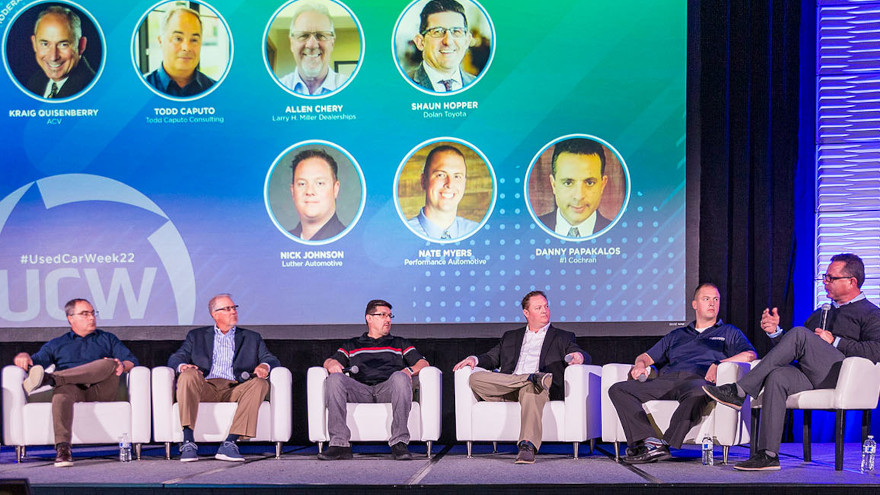Sourcing used inventory directly from consumers is not a straightforward endeavor

Action from "The New Consumer Journey Horizon" panel at Used Car Week. Photo by Jonathan Fredin.
By subscribing, you agree to receive communications from Auto Remarketing and our partners in accordance with our Privacy Policy. We may share your information with select partners and sponsors who may contact you about their products and services. You may unsubscribe at any time.
SAN DIEGO –
Sourcing used inventory was the common focus of two panels during Used Car Week, and some key themes emerged from “The New Consumer Journey Horizon and “Smarter Used Vehicle Buying” discussions during the event this month in San Diego.
Acquiring used vehicles directly from consumers is becoming an increasingly important channel for dealerships and it requires a special approach, said “The New Consumer Journey Horizon” panelists.
“You have to do something unique and different if you are buying off the street,” said Todd Caputo, president of Todd Caputo Consulting.
One thing that sets the customer experience apart on Clicklane, Asbury Automotive’s online used buying and selling platform, is the speed of the transaction, said Allen Chery, pre-owned industry relations manager at Larry H. Miller Dealerships.
Asbury acquired LHM in the third quarter of 2021.
A consumer can sell a car to Clicklane in under 20 minutes, he said, adding, “once a car is in the store, we can give a check within five minutes if there are no discrepancies in the information the customer gave us online.”
Subscribe to Auto Remarketing to stay informed and stay ahead.
By subscribing, you agree to receive communications from Auto Remarketing and our partners in accordance with our Privacy Policy. We may share your information with select partners and sponsors who may contact you about their products and services. You may unsubscribe at any time.
Letting customers know you buy used cars, not just take them in on trade-ins, is important, said Danny Papakalos, Director of Pre-Owned Operations at the #1 Cochran dealership group.
Dealerships are “associated with selling cars in the consumer’s mind,” he said. “We market the idea we buy cars.”
Luther Automotive Group has a branded “We Buy” used acquisition process marketed on its website and at its dealerships. It provides a service to customers and increases the group’s buying opportunities, said Nick Johnson, pre-owned director. “We look at all resources” when acquiring used cars, he said.
The grosses his group makes on consumer-sourced cars are better than those sourced at auction, said Nate Myers, used-car director at Performance Automotive. “We are in the acquisition game big time.”
Having a platform on which a consumer can upload a photo of a car to sell a dealership greatly boosts the chances of acquiring a vehicle, said panelists. “You can tell a lot from pictures,” said Caputo.
As for Clicklane, “pictures are important to us,” said LHM’s Chery. “Our close rate is night and day without pictures.”
Having a department dedicated to sourcing cars from consumers has been a winning strategy for his dealership, Hugh Palmer, director of pre-owned operations at Beaver Toyota in Cumming, Ga., said during the “Smarter Used Vehicle Buying” panel discussion. He called it the “war room.”
“We go to battle to get these cars,” said Palmer.
It employs several people who use specific metrics to identify cars the dealership wants in its pipeline. The department has its own space, apart from the retail area.
“We silo them,” said Palmer. “They don’t sell cars; they don’t work on deals. Their main job is to acquire cars for the dealership.”
He recommends hiring people who are “intelligent” and “hungry” to work on acquiring cars from consumers. For example, Beaver Toyota employs a 19-year-old University of Georgia student and a recent graduate from the University of Tampa.
“The person you hire into a BDC isn’t a salesperson,” said Danny Zaslavsky, dealer principal at Country Hill Motors and managing partner of Vincue, an inventory acquisition, management, and marketing tool. His dealership hires “curious” people who “like data.”
Both panelists stressed that the employees tasked with acquiring used cars from consumers should not have a strictly commission-based pay plan.
One mistake his dealership made was thinking the pay plan “had to be commission-based off the mark,” said Zaslavsky. “Starting out with a salary is really smart.”
Beaver Toyota has a starting salary and a bonus for cars purchased and retailed with caveats on total volume and gross profits for those cars. That keeps his employees “focused on what the mission is,” said Palmer.


